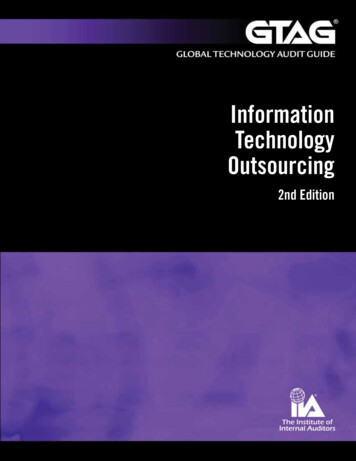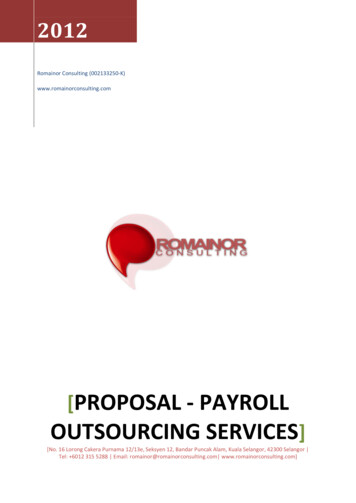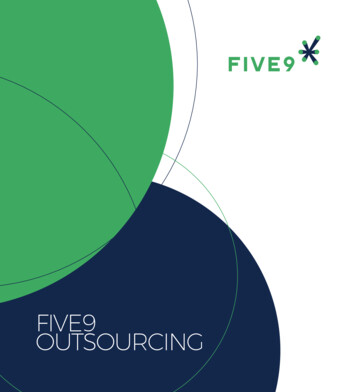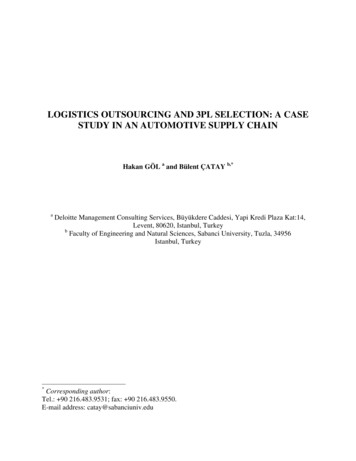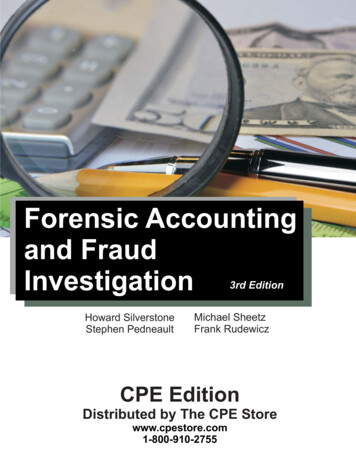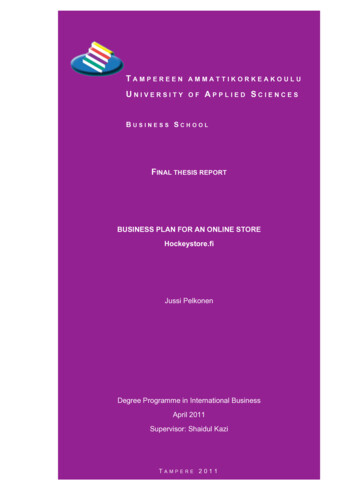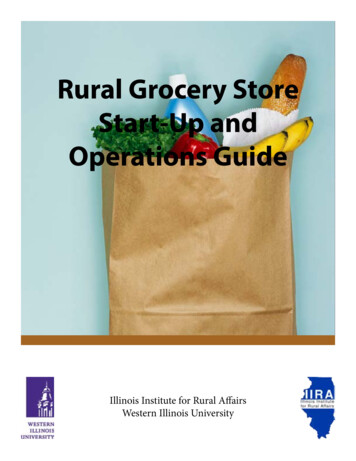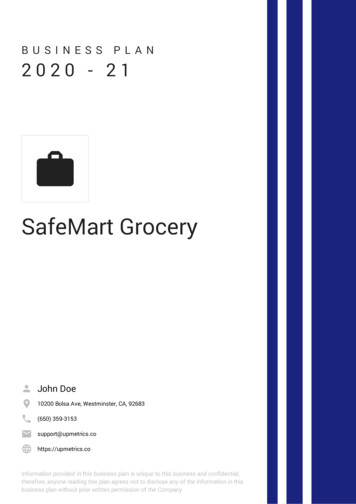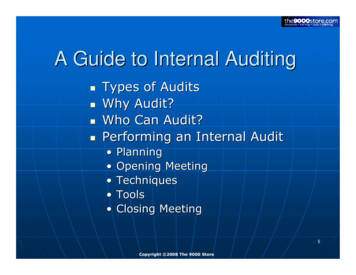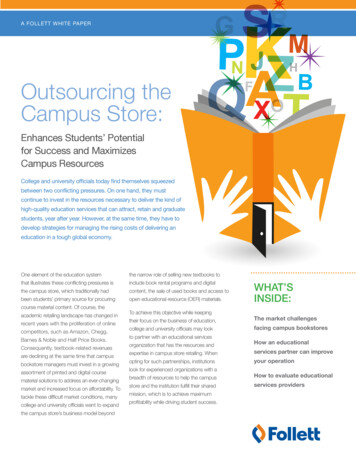
Transcription
A FOLLETT WHITE PAPEROutsourcing theCampus Store:Enhances Students’ Potentialfor Success and MaximizesCampus ResourcesCollege and university officials today find themselves squeezedbetween two conflicting pressures. On one hand, they mustcontinue to invest in the resources necessary to deliver the kind ofhigh-quality education services that can attract, retain and graduatestudents, year after year. However, at the same time, they have todevelop strategies for managing the rising costs of delivering aneducation in a tough global economy.One element of the education systemthe narrow role of selling new textbooks tothat illustrates these conflicting pressures isinclude book rental programs and digitalthe campus store, which traditionally hadcontent, the sale of used books and access tobeen students’ primary source for procuringopen educational resource (OER) materials.course material content. Of course, theacademic retailing landscape has changed inrecent years with the proliferation of onlinecompetitors, such as Amazon, Chegg,Barnes & Noble and Half Price Books.Consequently, textbook-related revenuesare declining at the same time that campusbookstore managers must invest in a growingassortment of printed and digital coursematerial solutions to address an ever-changingmarket and increased focus on affordability. Totackle these difficult market conditions, manycollege and university officials want to expandthe campus store’s business model beyondTo achieve this objective while keepingWHAT’SINSIDE:their focus on the business of education,The market challengescollege and university officials may lookfacing campus bookstoresto partner with an educational servicesorganization that has the resources andHow an educationalexpertise in campus store retailing. Whenservices partner can improveopting for such partnerships, institutionsyour operationlook for experienced organizations with abreadth of resources to help the campusHow to evaluate educationalstore and the institution fulfill their sharedservices providersmission, which is to achieve maximumprofitability while driving student success.
A FOLLETT WHITE PAPERThe CampusBookstore Grappleswith MultipleChallengesAcross the United States on campuses of all sizes,institutionally operated campus bookstores strugglewith several challenges that not only threaten thelong-term success of the bookstores themselvesbut also affect students’ day-to-day performance inthe classroom. Among these challenges are:1: course materials priced at levels that studentscannot afford, which reduces students’ chances ofsuccess, drives down campus store revenues andproduces inadequate financial returns on theinstitution’s investment in the campus store2: the significant amount of time, resources andeffort required to operate the campus store3: the need to source, aggregate and deliver traditionalprinted materials as well as an increasing amountof digital content, including OER materials andcustom products4: the need to adopt and integrate technology thatconnects student purchases to registration, financialaid and the learning management system to deliveran e-commerce shopping experience 24 hours a day
A FOLLETT WHITE PAPERA Closer Look1234Course material affordabilityas well as the hefty price tag of textbooks and materials, combined with the burden of hugeeducational loans prompts many students to look somewhere other than the campus storefor the books that they need. More and more students today comparison shop online to findthe best possible textbook prices, while many others decide that they cannot afford to buyany course materials at all. According to a student survey conducted by OnCampus Researchduring the fall 2013 semester, 30 percent of survey respondents “decided against purchasingor renting at least one of their required materials.” Some independently operated stores lack theexpertise and funding to offer large-scale solutions, including textbook rental, used and othercustom textbook solutions. As a result, many institutionally operated campus store revenuesare in decline, and the stores are unable to offer students affordable options.Time, resources and effortAnother big challenge for today’s independently operated campus stores is the sheercomplexity of providing relevant, affordable course materials. A bookstore’s main function isthe purchase and sale of textbooks, but that function entails multiple dynamic and fast-pacedtasks, all of which add up to significant costs in terms of capital and employee time and labor.Transformation to digital contentFaculty and students increasingly rely on technology, including digital course materialplatforms and learning management systems. Today’s students expect the tools that theyuse on a daily basis—tablets, laptops, e-readers and smartphones—to deliver their coursecontent as well. As publishers continue to make more digital content available, the campusstore staff must invest money, time and effort in digital technology to keep pace withpublishing trends and faculty and student expectations.Integration of technologyThe campus store is under growing pressure not only from faculty and students but also fromthe campus community to offer a wide range of e-commerce capabilities. For example, today’stechnology-savvy students want the campus store’s point-of-sale system to link with their schools’financial aid and online registration systems to deliver a seamless transaction. Furthermore, theywant to be able to shop, day or night, for the items that they want, from textbooks to clothing tocomputer supplies. The staff of an independently operated campus store must often rely on thecampus IT department or third party vendor for the required expertise with technology integrationand the provision of e-commerce services. Such an undertaking requires numerous steps,including approvals, funding and scheduling as well as the actual development work itself.
A FOLLETT WHITE PAPERHow the Right PartnerCan Help the CampusBookstore HelpStudents SucceedMany higher education institutions across the United States haveovercome these challenges and receive additional benefits bycontracting the operation of their campus stores to an educationalservices organization. On the financial front, an institution thatentrusts its campus store operation to an expert partnerorganization typically receives a commission formulated asa percentage of the campus store’s revenue.In addition, the institution no longer bears the costs and risks of managinga retail store operation, including the cost of inventory, in-store systems,labor and other administrative support (accounting, human resources, IT, etc.).In fact, the best educational services partners hire current full-time employees,thereby guaranteeing each of them continuing employment.To put it simply, by shifting the burden of managing their campus storeoperations to a partner organization, colleges can free up valuableinstitutional funds, energy and time, which they then can apply totheir core mission of educating students.Ensuring Affordable Course MaterialsEquipped to deliver a broad array of solutions designedto serve faculty and students, an educational servicespartner can help keep the campus store business oncampus. Thanks to well-established relationships withpublishers, the right educational services partner canoffer students new, used, digital and rental textbooksat prices that students can afford. Such solutionsnot only help students succeed but also positionthe campus store as a strong competitor in theacademic retail market, leading to a reverse inits revenue decline and a strong financial return.Thanks to well-establishedrelationships with publishers,the right educational servicespartner can offer studentsnew, used, digital and rentaltextbooks at prices thatstudents can afford.
A FOLLETT WHITE PAPERKeeping Up withTechnology and Student’sExpectationsKeeping Pace with the Digital EvolutionA top-notch educational services organization also can bringdigital capabilities to the table. These include partnerships withdigital-content publishers and wholesalers as well as its owninvestments in digital technologies that make course materialcontent, including open educational resources, availableacross multiple devices and software platforms.asee ClassOnlinRe1giLe3ar nntAn educational services partner has the technologicalexpertise to integrate the campus store’s POS with avariety of systems, including online class registration,financial aid and the learning management system. Bylinking these systems, the partner makes it possible forstudents to register online for classes, click directly afterwardto the campus store to purchase their books online and, ifnecessary, connect with financial aid to arrange payment forthe books. This level of integration simplifies, streamlines andaccelerates processes that typically are complex, confusing andtime-consuming for students. Fast, efficient, integrated transactionsbenefit the student, the bookstore and, ultimately, the institution itself.2 PurchOnlineoksBoIntegrating Technology forSimplicity and Efficiencyionrattsin g M a n a g emeEnhancing the Student Shopping ExperienceBecause students expect the campus bookstore to carry the latest productsand services, the educational services partner can use its market expertiseand leverage publisher relationships to develop and maintain an appropriateassortment of merchandise that meets the needs and wants of the campuscommunity. In addition, to allow students to shop whenever they want,the partner will provide a corresponding website that supports a 24-houronline shopping experience. E-commerce is an essential strategy, not onlybecause students expect its availability but also because online sales arethe top achievers in the overall growth of store services and thus contributesignificantly to the campus store’s top line.The integration of campus POSwith a variety of systems benefitsthe student, the bookstore and theinstitution as transactions becomefaster and more efficient.
A FOLLETT WHITE PAPERChoosing the RightPartner Is CriticalTo achieve their objectives for outsourcing thecampus store, higher education officials use severalcriteria to evaluate potential educational servicespartners. These criteria include:FINANCIAL STABILITYIn today’s tough marketplace, most independent campus stores,both academic and nonacademic, may be struggling financially.Consequently, institutions want to partner with an educationalservices organization that is financially secure itself and focuses100 percent of its efforts on academic retailing.BROAD PROGRAM PORTFOLIOThe ideal partner should offer a portfolio of programs thatincludes but is not limited to: a textbook rental program that includes a national assortmentof titles, which the partner can customize to a specific campus an order management system that connects all the partner’scampus stores to maximize inventory availability, reduce oreliminate out-of-stock situations and allow vendors to shipnew products directly to a customer a suite of one-stop shopping tools for faculty and studenttechnology needs: for faculty, a single-source program tosimplify the identification and selection of all course materials andsupplies and, for students, tools that enable them to buy thesematerials seamlessly, including a portal through which they canobtain access to all their digital content in a single location.PROVEN TRACK RECORDThe best educational services partner is an organization with deepexperience in the campus store market, one that can demonstrateexisting relationships with hundreds of colleges and universitiesaround the country and can document delivery of the financialand service results that institutions have come to expect. Thistype of educational services partner can implement best practiceswhich have proven successful in hundreds of other campus stores.ABILITY TO RETAINTHE INSTITUTION’S BRANDOne aspect of outsourcing the campus store that is especiallycritical to college officials is a potential partner’s ability to maintainthe institution’s brand and identity. Although the campus storemay be losing revenues, many officials hesitate to outsourcethe operation because they worry that the store would lose itsall-important brand. Consequently, they look for an educationalservices partner that can strengthen and enhance the school’sbrand, for example, by selecting school-branded clothing and giftproducts, and renovating the campus store facility in ways thatemphasize and promote the institution’s brand.
A FOLLETT WHITE PAPERBenefits for the Bookstore,the Students and theAcademic CommunityWhen a higher education institution entrusts its campus store operationsto the right educational services partner, everyone on campus wins. Byproviding consistent innovation in the people, products, services andinfrastructure necessary to serve student and faculty customers, the partnerorganization helps the institution attract, engage, retain and graduate itsstudents. By listening attentively to its campus customers and capitalizingon its own extensive experience, the partner organization can:1 offer students a broad range of affordable textbooksand course materials in printed and digital format on a new,used and/or rental basis and make them available forpurchase online and in the campus store2 transform the campus store into a strong marketplacecompetitor and, in the process, reverse the trendof declining revenues3 upgrade the retail environment by renovating thecampus store and applying best practices for campusretail experiences4 enable the institution to allocate more of its financial andpersonnel resources to its core mission of educating students5 help the campus store become a student destination forcampus activities or, in some cases, create a collaborativeenvironment for student socializing and studying6 provide additional programs in the form of innovation andtechnology to support faculty and students, therebyenhancing their ability to work and study in a streamlinedand efficient manner7 become part of the campus fabric as the partner builds strongbusiness relationships with the administration and, wherepossible, assists in the achievement of institutional goals
SummaryDaunting market challenges, including increasing course materials costs,declining revenues and growing competition from non-academic retailers,confront today’s campus store. However, by outsourcing the campus storeoperation, college officials can help this vital campus resource overcomethose challenges and evolve into a major source of support for student successand income for the institution.By engaging with the right educational services partner, college and universityofficials can ensure that the campus store evolves from its traditional businessmodel to a new, more flexible, responsive and profitable mode of operation.The right educational services partner is a financially sound organization thatcan bring a broad array of proven programs and capabilities to the campusstore and can demonstrate a lengthy and successful track record in theacademic retail market. Through its expert understanding of the mission,vision and strategy of both the institution and the campus store, the righteducational services partner can help the campus store achieve new levelsof service and profitability and thereby benefit the entire academic community.
About Follett HigherEducation GroupSince 1873, Follett has served as the trusted partner in education for studentsand educators at all levels of learning. Today, Follett is a privately held companyheadquartered in Westchester, Illinois that serves more than 47 million students.We deliver physical and digital learning materials, retail services, school contentand management systems to more than 80,000 early childhood, primary andsecondary schools, and on more than 1,000 college campuses.www.follett.com/managedstores
an order management system that connects all the partner’s campus stores to maximize inventory availability, reduce or eliminate out-of-stock situations and allow vendors to ship new products directly to a customer a suite of one-stop shopping tools for faculty and student

